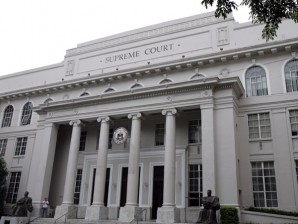MANILA, Philippines – Majority of the 54 previously disqualified partylists might be allowed to run again in the May 13 midterm elections under the new guidelines issued by the Supreme Court (SC), Commission on Elections chairman Sixto Brillantes Jr. said on Friday.
“Essentially 41 will be allowed to run … there are some who are likely to be immediately allowed,” Brillantes told reporters during their inspection in the PCOS assembly facility in Cabuyao, Laguna.
The other 13 partylists were new applicants that were previously granted a status quo ante order by the SC but not a mandatory injunction. The latter would have allowed them to run in the coming elections.
The 13 are: Ako An Bisaya (AAB), Alagad ng Sining (Asin), Alab ng Mamahayag (Alam), Association of Guard, Utility Helper, Aider, Rider, Driver/Domestic Helper, Janitor, Agent and Nanny of the Philippines Inc. (Guardian), Abyan Ilonggo, Alliance of Organizations, Networks and Associations of the Philippines (Alona), Partido ng Bayan and Bida (PBB), Pilipinas Para sa Pinoy (PPP), 1-Alliance Advocating Autonomy Part (1AAP), Kalikasan Akbay Kalusugan (Akin), Manila Teachers Savings and Loans Association (Manila Teachers), Association of Local Athletics, Entrepreneurs and Hobbyists (Ala-Eh).
The SC decision states that partylist groups need not be “marginalized or underrepresented” to run in the partylist elections.
The high court, voting 11-2, acting on a petition of 54 partylist groups barred by the Commission on Elections from joining the 2013 polls, said that as long as the “principal advocacy pertains to the special interest and concern of the sector,” they can participate in the elections.
Joining Senior Associate Justice Antonio Carpio who penned the decision are Associate Justices Teresita Leonardo De Castro, Arturo Brion, Diosdado Peralta, Lucas Bersamin, Mariano Del Castillo, Roberto Abad, Martin Villarama, Jose Perez, Jose Mendoza and Marvic Leonen. Chief Justice Maria Lourdes Sereno and Associate Justice Bienvenido Reyes dissented on this aspect.
Of the 54 partylist groups, 13 cannot participate in the upcoming elections but the Comelec has been tasked by the high court to determine their qualifications. They cannot participate because their names were not included in the ballot printing.
Among the groups that can participate in the upcoming polls include Ang Galing Pinoy of Representative Mikey Arroyo, Kakusa or Kapatiran ng mga Nakakulong na Walang Sala which was organized by convicted child-rapist and former Zamboanga Representative Romeo Jalosjos and the Bantay partylist group of fugitive Jovito Palparan.
The ruling will serve as a new guideline for the Comelec to re-evaluate the qualification of the sectoral parties.
“We hold that the Comelec did not commit grave abuse of discretion in following prevailing decisions of this court in disqualifying petitioners from participating in the coming 13 May 2013 partylist elections,” the high court said in a decision released on Friday.
“However, since the court adopts in this decision new parameters in the qualification of national, regional and sectoral parties under the partylist system…we remand to the Comelec all the present petitions for the Comelec to determine who are qualified to register under the partylist system and participate in the coming 13 May 2013 elections under the new parameters prescribed in this decision,” it added.
Following are the new parameters set by the high court:
- Three different groups may participate in the partylist system: (1) national parties or organizations, (2) regional parties or organizations, and (3) sectoral parties or organizations.
- National parties or organizations and regional parties or organizations do not need to organize along sectoral lines and do not need to represent “any marginalized and underrepresented” sector.
- Political parties can participate in partylist elections provided they register under the partylist system and do not field candidate in legislative district elections. A political party, whether major or not, that fields candidates in legislative district election can participate in partylist elections only through its sectoral wing that can separately register under the partylist system. The sectoral wing is by itself an independent party, and is linked to a political party through a coalition.
- Sectoral parties or organizations may either be “marginalized and underrepresented” or lacking in “well-defined political constituencies”. It is enough that their principal advocacy pertains to the special interest and concern of the sector. The sectors that are marginalized and underrepresented” include labor, peasant, fisherfolk, urban poor, indigenous cultural communities, handicapped, veterans and overseas workers. The sectors that lack well-defined political constituencies include professionals, the elderly, women and the youth.
- A majority of the members of sectoral parties or organization that represent the “marginalized and underrepresented” must belong to the marginalized and underrepresented sector that they represent. Similarly, a majority of the members of sectoral parties or organization that lack “well defined political constituencies” must belong to the sector that they represent. The nominees of either sector must either belong to their respective sectors, or must have a track record of advocacy.
- National, regional and sectoral parties or organizations shall not be disqualified if some of their nominees are disqualified, provided that they have at least five other nominees who remain qualified.”
“Since the court adopts in this decision new parameters in the qualification of national, regional and sectoral parties under the partylist system…we remand to the Comelec all the present petitions for the Comelec to determine who are qualified to register under the partylist system and participate in the coming 13 May 2013 elections under the new parameters prescribed in this decision,” the decision said.
Brillantes said he felt that the SC decision was “a good compromise decision.”
Comelec had previously disqualified partylist groups that he thinks do not really represent the marginalized sector.
“I don’t like [the decision] that much, but since we have already limited [the partylists] to 123, and it will not go up anymore to 123, it’s okay, it is a good compromise decision,” Brillantes said.
He said they will be able to issue a ruling on the partylists using the new parameters issued by SC before the May 13 elections.
Originally posted at 02:59 pm | Friday, April 5, 2013
